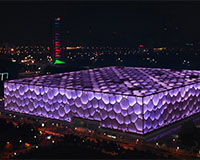CCU prof collaborates on public art installation at China’s Water Cube
Bleicher, associate dean of CCU's Thomas W. and Robin W. Edwards College of Humanities and Fine Arts, was the color specialist for this major art installation, a collaboration with two distinguished Chinese artists, Jennifer Wen Ma and lighting designer Zheng Jianwei.
The bubble-like "skin" of the massive five-story building, which covers over a city block in downtown Beijing, is illuminated each night with a light display that is designed to reflect traditional and contemporary aspects of Chinese life. The colors and movement patterns Bleicher developed are based on the I Ching, the ancient Chinese philosophical system, and on the daily mood of the Chinese people as expressed through social media.
Bleicher selected colors and movements of the lights to represent natural elemental states specified in the I Ching such as water, earth, mountain, etc. In addition, colors were selected to represent a range of emotions (anger, joy, grief, etc.) that correspond to the national temperament indicated by the millions of emoticons gathered and sorted from social media services such as Weibo, China's version of Twitter.
The resulting display of light, color and movement is visible every evening from dusk to 10 p.m. on the surfaces of the Water Cube building. Originally built to house water sports for the 2008 Olympics, it is one of the most popular attractions in Beijing.
"There is nothing quite like this project in the world," said Bleicher. "It gives a new definition to the term 'public art'. It allows the emotional feelings of the individual Chinese netizen to become a part of the artwork."
Bleicher was the only Westerner on the design team. Ma invited him to join the project after reading his book, "Contemporary Color: Theory and Use," part of which focuses on digital color, new technologies and global color issues.



